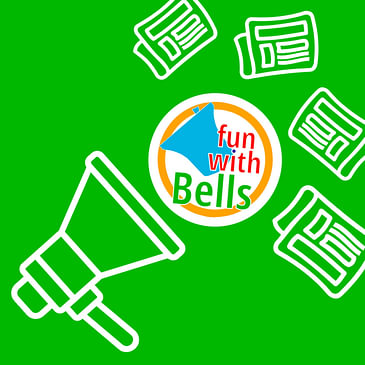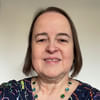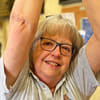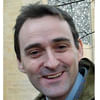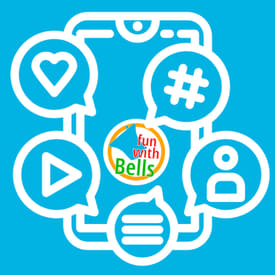This episode is jam packed with practical tips as host Cathy Booth, with the help of three engaging guests, explores how to get positive bell ringing stories into the media.
First off, ringers Matthew Butler and Kate Flavell talk Cathy through their experiences of making the news - either after being contacted by local radio, TV and the press, or trying to hit the headlines themselves.
Cathy then gets a very different perspective from interviewing journalist Andrew Napier, who very helpfully explains how things work from the other side.
So if your Facebook post goes viral, or you have a great news story to share, this podcast provides the perfect preparation for your interview, photograph or press release. If you do get the call, just go for it - see it as yet another opportunity to bust that myth that ringing involves monks being yanked up in the air!
Top 5 Takeaways
- Think of the one key message you want to get across, and don’t be afraid to repeat it.
- Practice explaining change ringing in a short and simple way that absolutely anyone can understand.
- For TV, print and social media, think about the visuals and remember to try and feature a range of ringers from different demographics if possible.
- If approached by the media always check what the story is and what they want from you. As a back up though, always be prepared to answer questions about noise complaints, just in case!
- Don’t be disappointed if your story doesn’t get featured or you work hard to set up an interview but it is cancelled at last minute, the news agenda does move very fast.
Comment from legacy website
Peter: (2023) - Excellent
Sponsor: This podcast is sponsored by the Association of Ringing Teachers (ART). To find out more about learning to ring, learning to teach or other resources to support your ringing go to bellringing.org
[00:00:00] KATE: One of the key things to do, is to have one key message in your head that you want to get across. But also a lot of preparation. I've got a standard list of what are the advantages of ringing bells. And my list is that bell ringing involves teamwork, it's physical and mental exercise, it has musical connotations, it's a huge social friendship organization and it creates opportunities for travel around the UK ringing bells and even abroad.
[00:00:32] CATHY: Hello, this is the Fun with Bells podcast and my name is Cathy Booth. This episode is about engaging with traditional media. Radio TV, and newspaper.
First, I talk to Matthew Butler and Kate Flavell who have appeared on TV and radio and then I interview Andrew Napier from the Hampshire Chronicle about how bell ringers should present themselves in the newspapers.
There is going to be a second episode associated with this one, which is coming out next week. This came about because while I was recording this one, there was a media blitz on the learn to Ring for the King initiative. And so I've got a second episode where I interviewed Simon Linford about that experience. But first Matthew Butler.
[00:01:21] MATTHEW: I'm, Tower Master of Bath Abbey. I learned to ring when I was 18, back in 2004 at Wimbourne Minster, in Dorset and I've been ringing at Bath Abbey since 2005.
[00:01:35] CATHY: I know you've appeared on TV and radio, but if you could start with your radio interview, please.
[00:01:41] MATTHEW: So this was, back in Easter 2020. If you recall, the lockdown started in late March, 2020, and Easter was only about two weeks after that.
And because it was right at the height of the lockdown and it was Easter Sunday and it was fairly early in the morning, Bath was the quietest I have ever experienced it being. And so the Easter hymns that we played on the Ellacombe chimes could be heard all over the city. And of course many people were sitting out in their gardens.
And so people who lived quite some distance away from the Abbey told me that they heard the chiming. I put a video of my chiming on Facebook and that ended up actually attracting 25,000 views. So it went viral and later on, on Easter Sunday, I received a call from BBC Radio Somerset, who wanted to interview me, and the other ringer the next day.
So they interviewed us for between five and ten minutes, and we explained why we'd chimed Easter hymns and how it was done, and the difference between an Ellacombe chime and change ringing, and the interviewer actually gave us quite a lot of time to talk about bell ringing, including not just Ellacombe chiming, but also how change ringing is normally done when there isn't a lockdown.
[00:03:09] CATHY: And how did he get hold of your telephone numbers in the first place?
[00:03:13] MATTHEW: I think that the initial approach was through my email address, which was on the Abbey website. So somebody had seen the video and then they Googled Bath Abbey bells and my email address was on the Abbey website, and so I received an email.
[00:03:29] CATHY: And, were you happy with how the recording came out?
[00:03:33] MATTHEW: I was very happy about it because it gave us plenty of time to explain change ringing to the general public who of course often aren't, very familiar with change ringing.
For example, the interviewer asked, "Is it like in the Mars bar adverts where you have Monks bouncing around on ropes." and I said, "No, it's not really like that at all. It's all very controlled and there is a technique which it takes, a long time to develop and it's very precise and there are all sorts of rules."
And I explained about the basics of change ringing, that the object is to produce lots of different permutations of bells rather than any particular tune which of course is different from Ellacombe chiming where I was actually chiming tunes. And that, there is quite a lot of maths involved in the theory of ringing, although you don't actually need to be a mathematician to understand it and so on.
[00:04:27] CATHY: So it was quite satisfying to be able to explain all that.
[00:04:31] MATTHEW: Yes, it was, because people have preconceptions of church bell ringing. Many people don't know anything about it at all. Many people think that it's just mechanized. Many people think that it's essentially random.
It might just be one bell just tolling, or it might be bells being swung randomly like they do on the continents. Most people don't have the faintest idea, of all the intellectual theory behind change ringing and the fact that it takes many months even to learn how to handle a bell properly, let alone how to ring methods.
So it was good to have an opportunity to explain that in my radio interview.
[00:05:10] CATHY: Would you have any tips for any other bell ringer who's approached by the media in the same sort of way?
[00:05:16] MATTHEW: I think one of the main tips would be, make sure that you have thoughts beforehand what you are going to say, and that you are able to explain succinctly what change ringing actually is and how it works.
Because actually it's not a straightforward concept to get across to somebody who's completely ignorant of change ringing. You have to not assume that they already know the basics and you have to explain it in, fairly straightforward terms. For example, you need to explain that is is not random.
That the object is to produce changes rather than tunes. That it involves bells swinging 360 degrees instead of being just tapped with hammers. That it involves considerable coordination and technique to be able to sound your bell at the right time, in time with everyone else, and that it involves memorizing often quite complex patterns, methods obviously. And the main thing is it's not mechanized and that's not difficult to get your head around. But I think people don't understand the depth of skill and theory involved in change ringing. So my advice would be try to get that across.
But my advice would also be, emphasize why it's a desirable pastime to have, because change ringing is satisfying because when it's done well, it can sound really good and it's a physical and a mental challenge, which if you succeed at it, for example by successfully ringing a quarter peal or a peal is hugely satisfying.
But it's not just that. It's not just the activity of change ringing itself, it's also the social element of it and the fact that bell ringers are really one big community. And that because it's so open and so sociable, you can make very good friends through ringing very easily.
[00:07:26] CATHY: Oh, we haven't talked about your other appearance.
[00:07:28] MATTHEW: So this originated with the BBC who were producing an episode of Escape to the Country, which featured two people who were attempting to relocate to Somerset and these people happened to be bell ringers. So the BBC was looking for a tower where they could be shown to be joining the ringers and experiencing what it would be like if they did move to Somerset and they wanted to join a local band.
I think the approach they made was initially to ART and I think they spoke to Rose Nightingale. So she thought of me and put them in touch with me. And I think also it probably suited them to go to Bath Abbey because they wanted somewhere that looked fairly photogenic. And obviously, they could show pictures of the inside of the Abbey and the Roman Baths and all that sort of thing. The approach came through ART to me. And they then said, can we come on such and such a date to film these two people ringing with you? And obviously I was very happy to allow that, although it wasn't just me, that I had to obviously check it with the Abbey authorities who were also very happy to allow it .
And they came in August, 2021. Initially, by the way, they said even though all national Covid restrictions had been dropped by them, they said that they were still keeping many of them in place, including two meters social distancing. And so they said, could you leave out every other bell so as to make sure that the ringers are standing two meters apart.
And I said "No, because that would sound absolutely ridiculous and it would look silly as well." And fortunately they didn't persist with that. So they turned up. There were probably about 10 technical people, Camera men and sound engineers and so on. And then of course there was the presenter herself, Briony May Williams, and the couple who were relocating to Somerset who were ringers. So this was all filmed on a weekday evening, and I assembled a team of eight ringers plus me so that we could ring all 10 bells with the couple and there would be one spare of us. Cause I thought I might need to perhaps stand behind the couple, I didn't know what standard their ringing was.
It ended up taking about three hours in total, even though the length of the actual clip was only about three minutes at most, possibly even less. But there were so many efforts of different camera angles and shooting things over and over again. And of course there was quite a lot of setting up of equipment and so on, and checking the various camera angles and the sound.
So it did take a long time, but we did get some really quite good shots I think. There were of course shots in the ringing chamber of the ringers, although unfortunately three out of eleven ringers present weren't actually shown, which was a shame. But for example, some of the shots were taken up in the bell chamber, which was important because people needed to see the bells actually going round so as to visualize how bell ringing works.
And there were some shots that were taken in the intermediate chamber, between the ringing chamber and the bell chamber, which I suggested, because in the intermediate chamber there's a big trap door that you can open up and look through the ceiling of the ringing chamber. So they put a cameraman there and pointed the camera through the trap door and got some really good shots of the ringers from above.
If you watch the footage, it begins by explaining that the couple in question are bell ringers, that if they moved to Somerset, they would be looking for a tower to ring at. That therefore, they had come and met me at Bath Abbey and that they were going to a practice to have a go at ringing at the Abbey and then showed them ringing some rounds.
But it then went on to, feature a bit by the presenter where she read out bits of the script that I'd submitted by email where I had explained in a nutshell how change ringing works. So for example, I'd explained that the object of change ringing is to produce permutations. That it relies on the bells being swung 360 degrees and controlled precisely by a bell ringer who'd had training, and so on. And it was actually quite a good brief explanation of what change ringing is about. There was a bit right at the beginning of the clip where the presenter, made frankly a bit of a silly comment, where she said, "so is there a technique to bell ringing or do you just pull the rope and hope for the best?" And I said to her, "I would definitely not advise just pulling it and hoping for the best, there is definitely a technique to it." But then of course it was followed by this precis of how change ringing works, which I had written in advance, in which the presenter then proceeded to read out. So I think it was quite a good advert for ringing on the whole. I think it probably helped that it featured a place quite photogenic, like Bath Abbey, and it showed a team of people who would be welcoming to ringers moving in from somewhere else and joining us.
And at the end, the presenter said, If these people do move to Somerset, would you be happy to have them in your team? And I said, "Yes, of course, come anytime. "So hopefully that succeeded in sending out the message that bell ringing is open and it's a community that you can join anywhere in the country there's a local tower that will welcome you.
[00:13:30] CATHY: So two very successful appearances in the media, it sounds like. And have you had any new recruits since all these appearances.
[00:13:38] MATTHEW: Yes, we have actually, we've been very lucky at Bath Abbey.
We were going to launch a recruitment drive shortly after the Covid restrictions were lifted. But in the event we didn't need to do that because people just appeared. So we've had several people just contacting us out of the blue, to say that they would like to learn to ring. And I think this is a result of the working from home revolution because increasingly you've got people who previously were commuting long distances and perhaps were traveling around the country who now can do most of their job from home.
So they not only have more time to pursue pastimes such as bell ringing, but they also are looking for something to do which doesn't involve just sitting at a desk and staring at a computer, something which involves getting out and about and being physically active. And meeting other people because if you are not going into your office you might want to find a community of people to be sociable with and go to the pub with and so on, who are not your work colleagues. And that is where bell ringing can come in.
[00:14:47] CATHY: Was there anything else that you wanted to comment on, Matthew?
[00:14:50] MATTHEW: One thing I would also say is that the optics are quite important and obviously as I said. You should make sure that bell ringing comes across well in terms of it being welcoming and being a fun thing to do and that it's an intellectual and physical workout and that it's a good way of meeting other people.
But I think, it's also worth bearing in mind just how it visually appears and what kind of faces you are putting on the screen if it is on the screen. I'm particularly mindful that the demographic of bell ringers is quite skewed towards the older end of the spectrum. And of course, there's nothing wrong with that intrinsically and we have many excellent older ringers who are very valued, but we do need to be thinking about the future and attracting younger people. And if people see only older faces bell ringing, then they can get the impression that it is mostly something that older people do, that it's not so attractive to younger people.
So one of the things that was quite important, I thought, was to get as many younger ringers as possible to appear on the screen. You do want older people as well because you don't equally, you don't want older people to think that it's just something for younger people, that it might be too strenuous for somebody in their sixties to undertake.
So you need to have a balance, but it is good younger faces on the screen as much as you can. Unfortunately with Escape to the Country, the youngest ringers were the ones who didn't appear because they were on the back bells and the shots were only really of the front bells, which was a shame.
But I think that's worth bearing in mind, to get younger ringers front and centre as much as you can.
[00:16:37] CATHY: Thank you very much indeed, Matthew. Kate, if you could please introduce yourself.
[00:16:42] KATE: My name's Kate Flavell. I ring at All Saints Church Kingston-upon-Thames, which is a 12, although we don't ring 12 all the time, we ring much lower numbers than that quite often. I've been ringing for a very, very long time since I was a youngster about twelve.
And I've been president of the Central Council of Church Bell Ringers for three years, which was quite an interesting experience. I've also been Master of the Surrey Association for three years. But at the moment I'm just the secretary at Kingston and have to organize when we are going to do ringing and stuff there.
[00:17:21] CATHY: So you've had a lot of experience in different senior roles within bell ringing. Good. So have you in any of those, had any experience of dealing with the media?
[00:17:31] KATE: I was the chairman of the public relations committee for quite a while after I was president, and obviously as president, you get approached by the media and have to do quite a lot of media stuff. So yes I have, and also in my professional life in the insurance industry, I had quite a lot of contact with journalists to explain various aspects of insurance. So yes, I have had quite a lot of contact.
[00:17:57] CATHY: And why should bell ringers or would bell ringers want to engage with the media?
[00:18:02] KATE: I think there's two reasons really. One is that sometimes the media actually come looking for you because something's going on, a national thing maybe like a royal wedding or like when the Queen died, and they want to know about what the ringing arrangements are for it.
Or it might be a local organization and they want to know what's going on in our locality to join in with this big national thing that's going on. But more often than not, bell ringers will want to make the approach to the media because they've got something that they want to get a bit of publicity for.
It could be a recruitment campaign that they're running or a bell restoration project, or it could be a local celebration or event that they're happening. And, you are wanting to get that out into either the local or possibly the national media and get a lot of people to know about it, and be able to present ringing in a very positive light and make people feel that it's something that they want to get involved with.
[00:19:03] CATHY: And have you got any tips on how you would attract the attention of the media to get that exposure?
[00:19:09] KATE: It's not always easy and it has changed a lot over the period that I've been involved because of course, people don't tend to read either national or local newspapers nearly so much as they used to.
A lot of it goes on online and quite often if stuff's going on there, media if they're interested, they might pick it up or you approach them and point them towards it and the media themselves obviously are online.
Our local newspaper is, I think it does still publish a paper copy, but most of it's online now.
[00:19:42] CATHY: And do you have any, particular experiences of working with the media that, that you would like to tell us about?
[00:19:48] KATE: Just recently there's been one where we were approached by the Alan Titchmarsh Sunday morning program. They're running a series of pieces on towers and ringing linked to this Ring for the King in connection with the coronation in May, and they wanted to come to Kingston, and we wanted to make it about more than just bell ringing.
And because there were seven Saxon Kings crowned in Kingston allegedly, and that Kingston Church makes a lot of fuss about that and calls it the place where England began because the first king of all of England was crowned there. So we managed to get together a little team of people. In fact, I couldn't actually go on the day but I put somebody else very articulate and sensible in charge of it. Dealing with all the filming and the people were there filming for about six hours and it turned into a six minute piece, which was a really good piece actually. It was about ringing, it was about ringing for the King. It was about Kingston and the Saxon Kings and it all went off extremely well.
I've had less successful experiences where, I had a phone call once, first thing in the morning from a television company saying there was something going on, some event, and they said, "Oh, we want to film some bell ringing today. We need to do it today, and it's got to be somewhere in the London area." And I spent several hours getting in touch with a lot of ringers that might have been ringing in the London area that day and eventually found someone who was prepared to have a TV team turn up and film them. And I went back to the TV company and they said, "Oh, it's all right, we've found someone else don't worry."
And I'd just wasted practically the whole day. And I was actually extremely angry, but it was a very interesting lesson to learn, that they do that. They can be, not always, the Alan Titchmarsh people were excellent, but sometimes they can be extremely frustrating people to deal with and you can waste an awful lot of time sometimes. And really, you have to be prepared to do that. And you have to have quite a lot of patience, I think, which isn't one of my great strengths, I must say.
[00:22:00] CATHY: When you've been interviewed, what preparation have you done?
[00:22:04] KATE: I think one of the key things to do is to have one key message in your head that you want to get across. And it's to do with whatever the event is that you are being interviewed about. What is your key message? And it might be, "this is everybody's big opportunity to learn to ring the bells, to ring for the king, for the coronation."
Or it might be, "this is a really good website to look at, which you'll tell you everything you need to know." Have it there ready, written down so you can say it. Or there might be a date, a specific date, a special date that's coming up that you want everyone to remember. So just have this one thing written down that if nothing else works, at least you get that one message across and you can go a bit further and have maybe three things that you could say, have a couple of backup things.
But your one key message, and you can even say it more than once and say it in different ways so that you make absolutely sure if they edit what you are saying, that your one key message does get through. But also a lot of preparation, I've got a standard list of what are the advantages of ringing bells, and that's a handy thing to have, by you or to send out to people if they email you and ask.
And my list is that bell ringing involves teamwork. It's physical and mental exercise. It has musical connotations. It's a huge social friendship organization and it creates opportunities for travel around the UK ringing bells and even abroad. And if you've got those things, quite often something there will strike a chord with somebody, or you can give them all of them and they can pick and ask you more about some of them and how it works.
[00:23:49] CATHY: They sound like, good tips. Do you have any other tips for bell ringers engaging with the media?
[00:23:54] KATE: I think one thing is to find out what it is that sparked their interest or what it is that they want to get out of the contact.
So that A) you're are not tripped up by something nasty. Like it might turn out that there's a neighbour who's been complaining about the bells ringing and they haven't actually mentioned that, and they're suddenly going to throw that at you unexpectedly. So ask them, where they're coming from. Why did they approach you? What are they interested in? How are they going to be able to help you, and how can you help them get what they want out of it? What are they looking to achieve and what do they need from you? If you can get those things out on the table before you start, you are more likely to have a successful encounter with them and not get tripped up.
But on the other hand, do have something ready to say about how to deal with complaints if people are complaining about the bells ringing. How to distinguish between complaints about the bells ringing and complaints about church clocks that chime all night, because some of the stuff that gets in the press quite often is clock's striking rather than actual bell ringing. So make sure you know exactly what it is you're talking about. And the other thing is to have something ready to say about safeguarding. Just in case something comes up about that. So you can talk confidently about how bell ringers take safeguarding seriously and these are the things that we do in our church or in our Guild, or in bell ringing generally to make sure that everybody's safe when they come ringing.
[00:25:30] CATHY: Have you had any feedback or things that have happened after the programs have gone out?
[00:25:36] KATE: Not a huge amount, but interestingly, after the Alan Titchmarsh program went out and one of our bell ringers at Kingston had been interviewed on that, and she happened to mention that she was 88 and that she'd been ringing for over 60 years and that her husband was over 90 and he was still ringing at Kingston.
And we then got a contact from the Southwark Diocesan office saying they wanted to write a piece about this couple and their ringing careers and how you can still be ringing at a great age and so on. So everything that you do that involves media contact does have the opportunity for a spinoff somewhere else, and that's always worth bearing in mind.
[00:26:21] CATHY: We've come to the end of my questions, but was there anything else that you were wanting to say, Kate?
[00:26:26] KATE: I think it's an area that people can sometimes be a bit frightened of. They're not confident enough themselves to do contact with the media and I would say, if you want to start getting into it, get one or two other people to work with you. Find an experienced ringer, preferably somebody who can talk knowledgeably and confidently about ringing, if you feel perhaps you can't do that and get somebody else who can perhaps talk about the history of ringing, which is something I don't personally know very much about, and if I'm expected to talk about the history of it, I've got several friends that I'll bring in and say, that one's for you then.
Don't expect to know about absolutely everything and work with, as I say this little group of two or three people, and learn from them. How they do it, what they say, the mistakes they make. We all make mistakes and they're good for learning from.
[00:27:20] CATHY: Is there anything else you wanted to say?
[00:27:21] KATE: I've just jotted down some summary points, at the end of my preparation that I've done and this is, to have standard information prepared and easily available for yourself.
Prepare as much as you can ahead. Ask them what they're looking for and help them to get it. Involve other articulate ringers to work with you. Be ready to deal with difficult questions about complaints and to questions about safeguarding. Those are my key tips, I think.
[00:27:50] CATHY: Thank you very much. And Andrew, if you could introduce yourself, please?
[00:27:54] ANDREW: My name is Andrew Napier. I am the Head of news, Chief Reporter, of the Hampshire Chronicle and I've been working for the Chronicle for the last 15 years or so. Just as a local reporter covering everything that happens in the Winchester and Romsey area.
[00:28:13] CATHY: That's one thing I was interested in is how you try and cover everything.
[00:28:17] ANDREW: First of all, you have to accept that you can't cover everything because in a city of Winchester size, it's about 40,000 people. There's 40,000 different stories but what we do, is we touch base as regularly as we can with all the organizations and the potential sources of news. So that's obviously the basic ones, such as the Police and the Fire, the Councils, even down to the Parish Council levels. We try and just keep tabs on what they're doing, what's being said, what's being done. And obviously, because news should be about people, we still try and speak to people, as many people as we can in whatever format.
[00:29:04] CATHY: So coming from the bell Ringer's point of view. If the bell ringers have a story how do they attract the attention of the newspaper?
[00:29:12] ANDREW: It's as easy as falling off a log, really. I speak to a lot of people who seem to think getting an article in the newspaper is the equivalent of climbing Mount Everest, and it really isn't. As Woody Allen says, "99% of success in life is in just turning up." So if any group of bell ringers have got anything they want to publicize, they just need to contact us in whatever form, probably email is the best way now. The vast majority of information we get in the form of press releases comes in via email. Of course, we just get hundreds and hundreds of emails. So just send us an email with the details of what you want to publicize.
Papers like the Hampshire Chronicle, they're different to national newspapers. Obviously, a national newspaper chooses its news from everywhere. It can decide, it wants just the, the fatal train crashes, the football transfers, whatever. But a local paper very much wants to report and reflect what's happening on its doorstep and obviously bell ringing is a part of that. We want to report and cover as a broader spectrum of what happens in our area and obviously, this is one of them.
[00:30:29] CATHY: How do Bell ringers make sure they get a positive headline rather than a negative one? How does that work?
[00:30:35] ANDREW: National Papers are always trying to, I'm simplifying, but they try and obviously shock and sensationalize a lot of what they do. A local paper doesn't really do that because it lives within the community that it reports on. Whereas a national newspaper is based in a skyscraper in Docklands, in London. So they can say what they like, but a local paper, if you say something about somebody, you take the mickey out of somebody, or you write a negative headline, you're likely to bump into that person in Marks and Spencers aren't you, or the pub. If the bell ringers are bell ringing and a bell falls on somebody's head, then that would attract from I think the, where you are coming from, a negative headline.
So I can't guarantee that any story about bell ringers will always have a positive headline, but the vast majority of them will.
[00:31:30] CATHY: And do you like people to more or less write the article for you? Do you interview them or do you just take the bare facts and write the story yourself? How does that work?
[00:31:41] ANDREW: Sometimes a bit of all three. It all depends. the first thing you said, "Do you want them to write the article?" You can do, but then of course the chances are it will probably be rewritten because unless it's been written by a journalist or someone who's familiar with the style of the Hampshire Chronicle, it probably won't be written in the way that we would normally present news. I'd urge nobody to get too loyal to the words that they write, because the chances are it would get changed. Would we want to interview anyone? That really depended on the story. If it's say, just thinking aloud. A new group of bell ringers forming and they're going to be ringing the bells in a church for the first time in 20 years.
That would be a story where we'd probably want to speak to somebody just to get quotes. Quotes, make stories live. But if it was say, a well-established bell ringing group and they were sending us a press release just to say we're looking for some new members, then that's the sort of thing we may not need to actually interview somebody. And the third point, I think you said was whether we just wanted the facts, and we'd bash something together. Yeah, that would be okay. As long as we had enough. It's the five Ws. I don't know if you're aware of the five Ws.
[00:33:04] CATHY: Ah, yes. Who, what, where, when, why, and how is it?
[00:33:08] ANDREW: Yeah. Who, what, where, why, when and then H, how on the end. So that's always been the journalistic maxim and it still is.
As long as we get the information that would allow us to put together a sensible story that has all the facts that an interested reader would need, to get involved or join in, or listen out on a certain day. That's the best advice. But one thing, don't be disappointed if it's not used because the other thing about newspapers is life is inherently chaotic. So newspapers, how they cover things is inherently chaotic. You have quiet weeks. You have weeks when it all happens. And, we sometimes get things from clubs and societies and, it's not used, and then they get disheartened.
They think, "Oh, the paper's not interested." which couldn't be further from the truth, but, a newspaper like the Hampshire Chronicle is 64 pages. It has around about 120, 130 sort of separate items in it. And some weeks you could have double that and things do have to be cut. So don't take it personally if stuff isn't used it's simply the mass of material that we have.
But certainly, if the Hampshire Chronicle or the Romsey advertiser got a press release email about bell ringing in their patch. I'd be 99% sure we'd use it at the earliest opportunity, in the newspaper. And of course, we all have websites now, and anything that goes in the paper or most of it also goes on the website too.
But the other thing to mention is we're always looking for decent photos. So if you know a bell ringing group wants to publicize its work, then send us in a photo of the group in action, preferably landscape shape. If somebody sends in a portrait photo, then it's liable to be cropped. And of course, that can end up looking slightly daft. Yeah.
[00:35:15] CATHY: So landscape, it's wider than it's tall. those sound like some really useful tips. Okay, thank you very much Andrew.
[00:35:22] ANDREW: No, no problems.
[00:35:24] CATHY: Thanks to my guests, Matthew Butler and Kate Flavell who are bell ringers and Andrew Napier from the Hampshire Chronicle. If you've enjoyed this episode, then please share it. This podcast was put together by a team, special thanks go to Anne Tansley Thomas, Emily Roderick, John Gwynne, Emily Watts, Leslie Belcher and the Society of the Cambridge Youths for the recording of their ringing.
[Bells ringing rounds]

